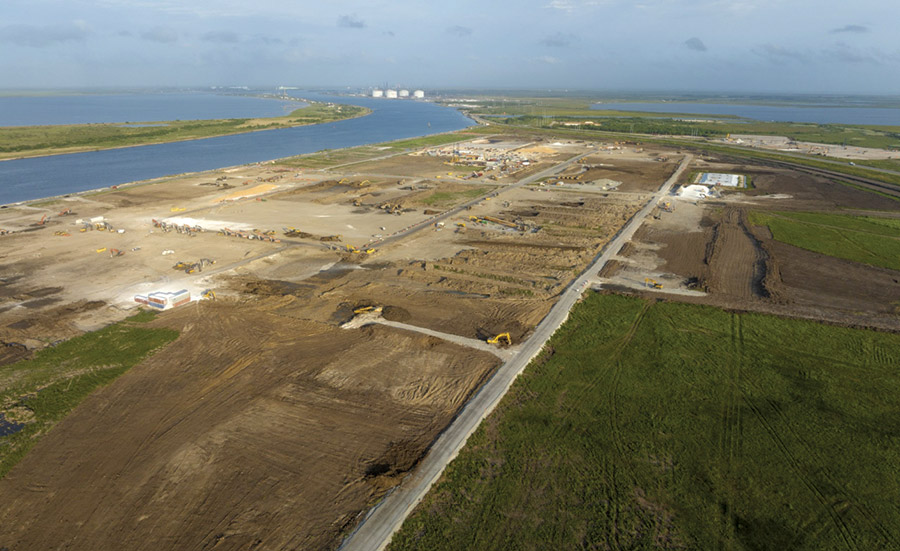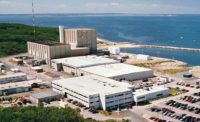Related Link:
ENR Top 400 Sourcebook (PDF)
Subscription Required
Construction is underway on the first phase of Sempra Infrastructure’s $13-billion Port Arthur LNG export terminal in Texas near the Gulf of Mexico, following the energy firm’s award to Bechtel Energy of an EPC contract to manage the two-train project.
The company asked the Federal Energy Regulatory Commission to allow the contractor to expand work schedules to 24-hour shifts to improve workflows and streamline schedules. The terminal, with ConocoPhilllips also as a partner, will have a nameplate capacity of 13 million tons per year and includes two gas storage tanks. The first liquefaction train should be completed in 2027 with the second finished in 2028.
Bechtel on Aug. 29 awarded Great Lakes Dredge & Dock Corp. the marine dredging and disposal contract at the 2,842-acre site. The company will dredge the LNG berthing pocket on the Port Arthur ship canal that leads to the Gulf. Dredged material will be placed in areas to restore marshlands within a wildlife refuge. Work is set to begin later this year. Great Lakes did not disclose the contract value, but CEO Lasse Petterson said it will help boost its backlog to over $1 billion.
Also awarded a contract last month is a unit of Ebara Corp., which will supply cryogenic rotating equipment, including boil-off gas compressors and end flash gas compressors. Earlier, Baker Hughes was awarded the contract to supply the main refrigerant compressors, which the firm said will be manufactured and tested in Italy, for phase 1 liquefaction.
Sempra’s proposed second phase at Port Arthur has yet to receive FERC approval, pending since 2020. That action was struck from the agency’s July meeting agenda, but Sempra CEO Jeffrey Martin told investors the firm expected it in the next few months. The project also includes an agreement with pipeline developer Williams Co. to build the 72-mile Louisiana Connector that is set to deliver natural gas daily to the plant.
TVA
Utility Giant Moves on Gas Plants to Replace Coal Units
The Tennessee Valley Authority is replacing one of two retired units at its Cumberland coal-fired power plant in Tennessee with a 1.5-GW gas-fired unit. TVA has not yet selected an EPC contractor, but the project “has entered the design stage” and will operate by 2026, said a spokesman. Three completed gas turbines at the Colbert plant in Alabama are set to produce power by year end, and about 550 MW of gas units at the Johnsonville plant in Tennessee will start up in Q4 in 2024. TVA will make a final decision later this year on replacing the 1.4-GW Kingston coal-fired plant in Tennessee with a 1.5-GW gas plant and 122-mile pipeline.
BANPU
Thai Gas Producer Expands CCS Pilots at US Locations
Banpu Public Co., a Thailand natural gas developer, in August agreed with Louisiana officials to develop a carbon capture and sequestration pilot project, its third in the U.S. The project would sequester carbon dioxide from “local emission sources,” the firm said, but more details were not available. Banpu said its first $34-million U.S. sequestration project in north Texas will dispose of about 210,000 metric tons of CO2 a year from natural gas production when complete by December. A second Texas project, set to cost up to $24 million and operate in late 2024, will sequester about 80,000 metric tpy. The company, which also operates in Pennsylvania, said it seeks more potential projects.
U.S. DEPT. OF ENERGY
$500M in Grant Awards for CCS Infrastructure Planned
The U.S. Energy Dept. plans to award about $500 million in grants later this year to offset costs of increasing capacity of planned pipelines to carry carbon dioxide from carbon capture projects to geologic storage, and to plants for conversion into products. The capacity would accommodate CO2 from future direct air capture projects and industrial operations coming online. Project finance for added capacity is nearly impossible without contracts for supply and offtake, DOE said. Existing carbon dioxide pipelines are not eligible, but repurposing of other infrastructure would qualify.






Post a comment to this article
Report Abusive Comment